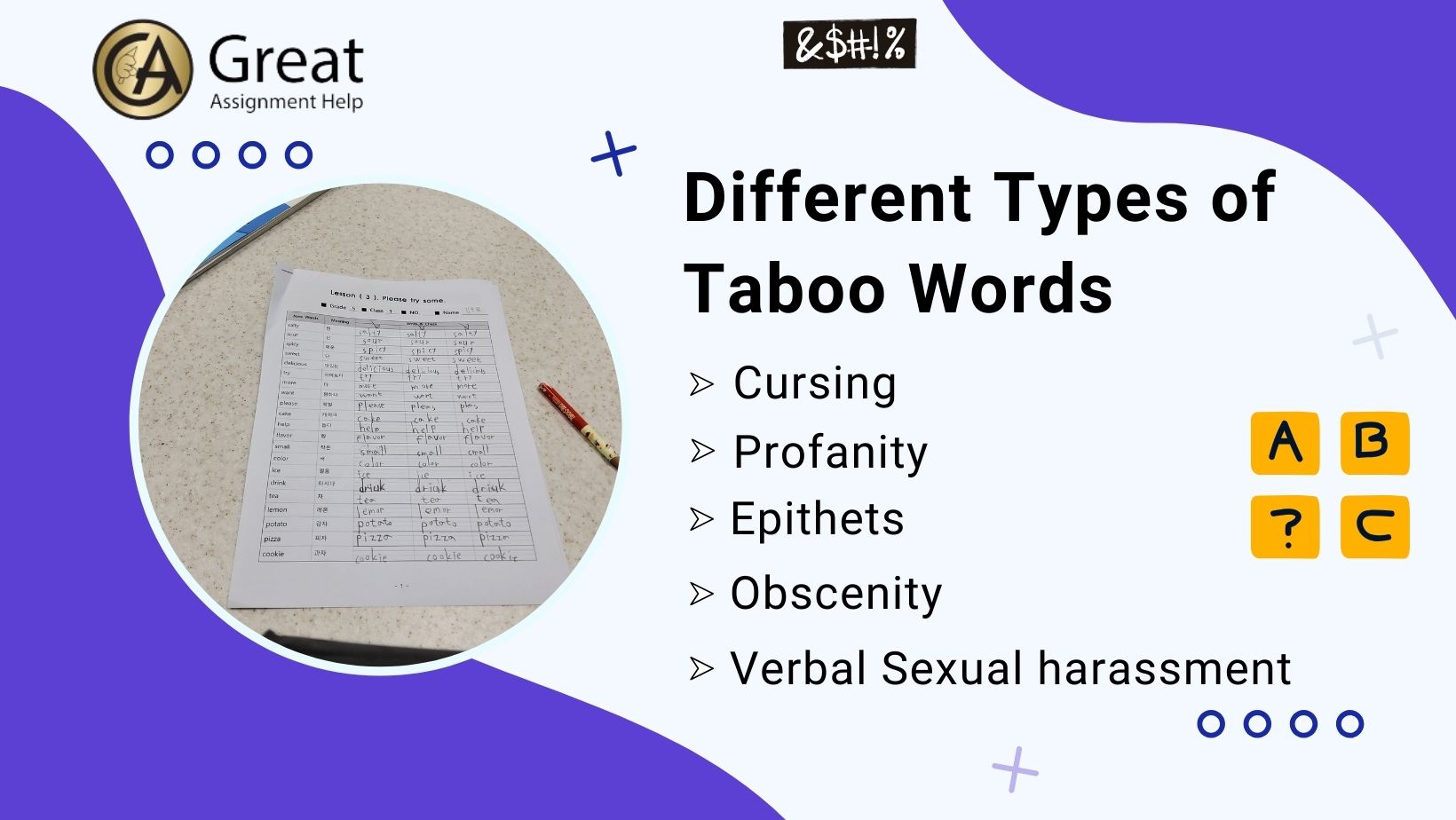This article has been reviewed and updated with current information, new examples, and the latest academic requirements for 2025
Language is a strong tool we can use to express ourselves and connect with others. But some words or topics are considered off-limits or uncomfortable to discuss. These are called taboo languages, and they usually vary across cultures. What might be okay to say in one culture could be rude or hurtful in another. Taboo language typically affects how we communicate, and it also creates an impact on our thoughts and feelings. Note that understanding taboo language will give you a clear idea of communication and culture. Would you like to enhance your knowledge of taboo language? If yes, then continue reading this blog. Here, we have discussed what taboo language is and how it shows up in different cultures. Also, we have explained the impact of taboo words, their linguistic applications, and how to avoid saying hurtful words using indirect language or euphemism.
What is Taboo Language?
Taboo language refers to words or phrases that can be hurtful or offend people in certain cultures or situations. These words or phrases are often considered socially unacceptable and can vary greatly from one place or group to another. If you want to communicate effectively without any misunderstandings, then you must be aware of taboo language. Moreover, when you have a good understanding of taboo words and phrases, you can have a respectful and considerate interaction with people from different backgrounds.
The Impact of Taboo Language in Communication
Communication will be greatly affected if you use taboo words. Often, some people use taboo language for different purposes, like expressing strong emotions or getting a reaction. However, using taboo words can hurt or offend people and may lead to problems in relationships or even social issues. Generally, each culture and group will have different rules about what language is okay for them to use. Therefore, before you initiate a conversation, you must know what is acceptable in various situations.
Remember, over time, what is considered taboo can change. So, it is also important for you to stay updated about what is currently considered taboo. If you have good knowledge of taboo language, you can communicate more effectively and have respectful conversations. Also, you can understand the social and cultural aspects of a particular language.
Different Types of Taboo Words

Several words are considered taboo in different communities. However, what words are classified as taboo depends on a particular community’s norms, culture, and practices. These norms will shape how we categorize taboo words and how offensive or inappropriate they are.
According to research in 2010, there are five types of taboo words. It includes the following
Cursing
Cursing refers to using strong and hurtful words to express anger, frustration, or hatred towards someone or something. Examples include words like “fuck,” “damn,” and “shit.” These words are often considered rude or offensive.
Profanity
Profanity often involves using sacred or religious words disrespectfully. Examples include phrases like “goddamn” or “holy fuck.” These words can be shocking or offensive because they are associated with things people consider holy. Sometimes, people use them to express strong emotions like surprise or disbelief.
Epithets
Epithets are hurtful words or insults that people use to mock someone’s characteristics, appearance, or identity. They often generate negative emotions and can be racist, sexist, homophobic, or discriminatory towards people with disabilities. Examples include slurs and derogatory terms like wop, bitch, whore, etc that are intentionally hurtful and demeaning.
Obscenity
Obscenities are words or phrases that refer to sex or bodily functions rudely. Examples include terms like “cocksucker” or “cunt.” These words can express strong emotions, often negative. But sometimes, they also convey confidence or humor in a joking or casual context. In general, the way people use these words will determine their impact.
Verbal Sexual harassment
It involves using unwelcome, inappropriate, or offensive language related to sex, body parts, or clothing. This type of language can demean and hurt people. Hence, it falls under the category of taboo language.
Understanding Taboo Language in Diverse Cultures
Taboo language is important in shaping a country’s culture and customs. When people from different cultures communicate, it is essential to know about the taboo words.
For example, in Chinese and British cultures, there are different taboos around topics like death, numbers, and names. These differences come from various factors like location, customs, and beliefs. In China, people consider four unlucky because it sounds like “death.” On the other hand, in Britain, certain historical reasons make some names seem offensive.
To have an effective communication, Chinese people learning English must know these differences. By understanding what words or phrases might be offensive, they can avoid using them and show respect for the other culture. Furthermore, it will help them prevent misunderstandings and promote better communication between people from different backgrounds.
Taboo Language in Academic Writing
In academic writing, it is essential to be careful with the language you use. This is because researchers build knowledge on evidence and research, and they support claims with facts. Instead of making bold statements, always use language that suggests more research is needed.
To do this, you can use modal words like Can, May, or Might. Modal words will help you show that you are not entirely sure. Also, you can use phrases like “some evidence suggests” to be more cautious. But in academic writing, remember not to make absolute statements unless they are true.
In case you have strong evidence, be sure to make bold claims. Simply by using cautious language, you can keep your writing credible and trustworthy. Furthermore, you can show how thoughtful you are in your research and build knowledge in your field.
Application of Taboo Words in Media and Pop Culture
Taboo topics are often controversial in the media, including books and movies. Some writers and directors use taboo language to explore difficult subjects and evoke strong emotions. However, this can lead to censorship and debate.
Examples of works that focus on taboo topics include books like “Lady Chatterley’s Lover” and “Lolita,” and movies like “Reservoir Dogs” and “The Wolf of Wall Street.” These works used taboo language to depict real-life situations, challenge societal norms, and create important discussions.
In general, the reasons for using taboo language vary. Mostly, some works aim to raise awareness about sensitive topics, while others seek to reflect everyday conversations or challenge censorship. However, by using strong language, one can grab attention, reduce ignorance, and encourage people to think critically.
The debate around taboo language continues, with some people arguing for its normalization and others calling for stricter limits. Ultimately, the use of taboo words in media remains a complex and contentious issue.
Use Euphemism as an Alternative for Taboo Language
Taboo words are impolite and insensitive. So, it is always better to avoid using them in conversation. If you want to discuss sensitive topics without offending others, then try using euphemisms. Especially, with the help of Euphemisms, you can discuss sensitive topics politely. Furthermore, it will help you hide the truth or reinforce negative stereotypes. Euphemisms are milder or indirect expressions with which you can effectively replace taboo language.
Research has shown that taboo words can evoke strong emotions and physiological responses. But if you are aware of taboo language and use euphemisms thoughtfully, you can communicate more respectfully and avoid unintentionally offending others.
Wrapping Up
By now, you would have gained a better understanding of taboo language, its linguistic applications, and the impact of taboo words. Knowing about taboo language will help you stay mindful about words and communicate more effectively. No matter whether you are speaking or writing, by not using taboo language, you can escape from the consequences it provides. If you have several doubts about language, then reach out to us for help. The language experts from our team will offer you the best linguistics assignment help and clarify all your doubts. Furthermore, with our expert guidance, you can effectively complete your language research papers on time and secure your desired grades.



